Privacy Policy for a Mobile App | Mobio Group
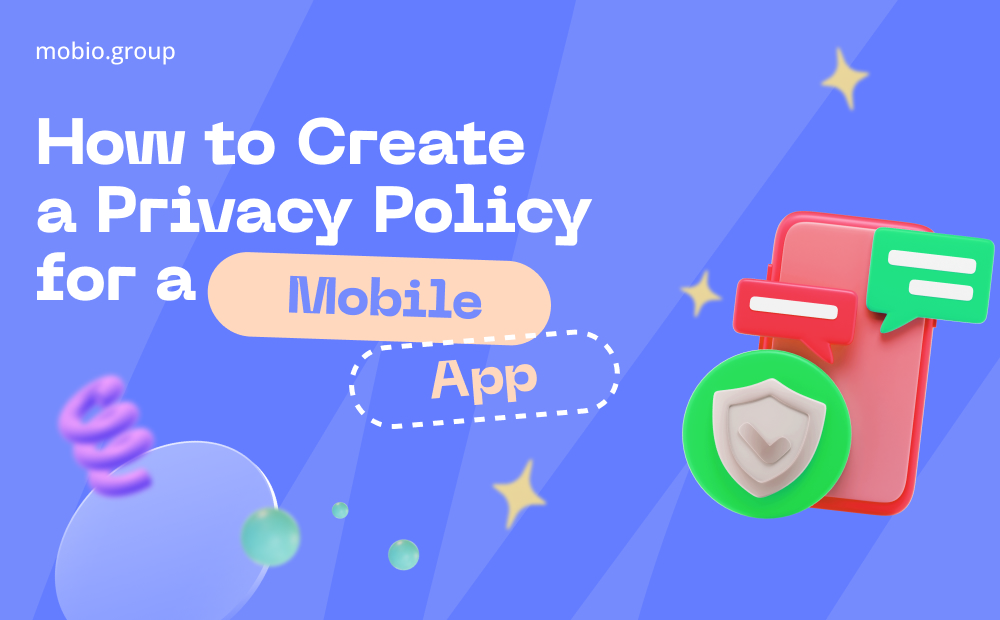
In the vast majority of cases, mobile apps collect and use users’ personal data. This can be information provided voluntarily (full name, email, date of birth) or data collected indirectly (user’s geolocation, frequency of visits or search history in the browser). Personal information collected through SDK, may also be transmitted to third parties. Due to the tightening of rules on the protection of user data, a well-written Privacy Policy (PP) is essential. In this article, Mobio Group will discuss why a PP is necessary and provide a comprehensive guide in creating a Privacy Policy for a mobile app.
What is a Privacy Policy and Why is it Needed?
A Privacy Policy is a legal document that describes how a mobile app collects, uses, and stores user data, as well as where this information may be transmitted. Such a document not only strengthens user trust but also is necessary under several legislative acts. Thus, the processing of personal data is regulated:
- In the EU — GDPR (General Data Protection Regulation)
If the app will be distributed beyond the local market, it must comply not only with local but also international acts. Non-compliance with legislative requirements may result in a fine of up to 2% of the company’s annual gross receipts. For example, in 2022, the French CNIL (National Commission on Informatics and Liberties) fined Google €150 million and Facebook €60 million, stating that “facebook.com, google.fr, and youtube.com do not allow users to ‘opt-out of cookies’ as easily as they ‘accept’ them.”
From app to app, Privacy Policies can vary greatly. A social media app may collect more personal data than a weather forecasting app. A gaming app may use information for in-app purchases. A fitness app will track data for measuring progress and workout monitoring. It is important to adapt your Privacy Policy to the specific needs of your app and be transparent with users about how their data is being used.
When a Privacy Policy is Needed?
For mobile apps, having a Privacy Policy is mandatory:
- For iOS apps, this is stated in the Review App Store:
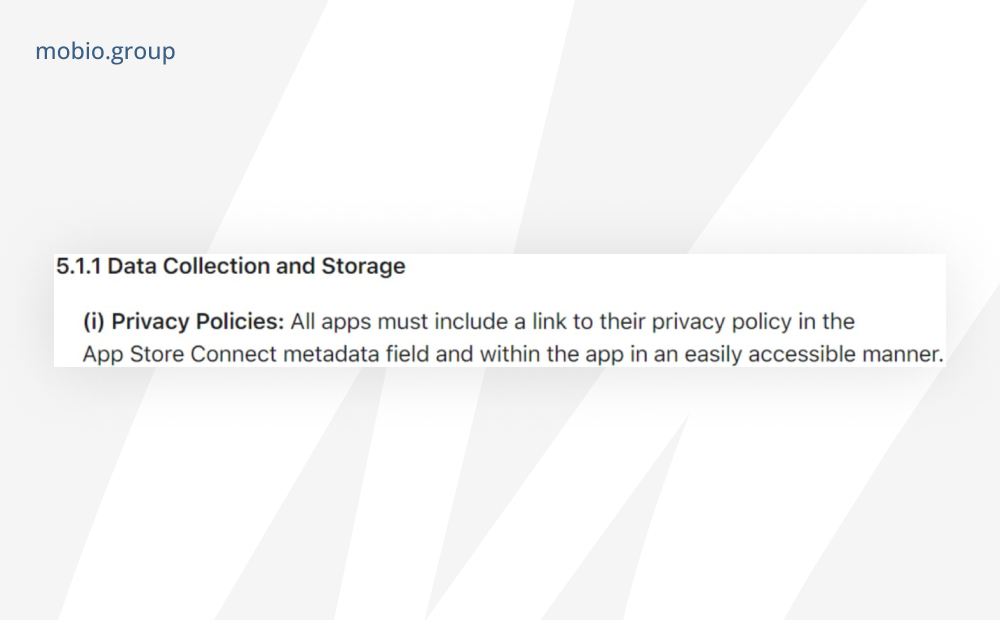
- For Android apps, the requirements are outlined in the Policy Center:
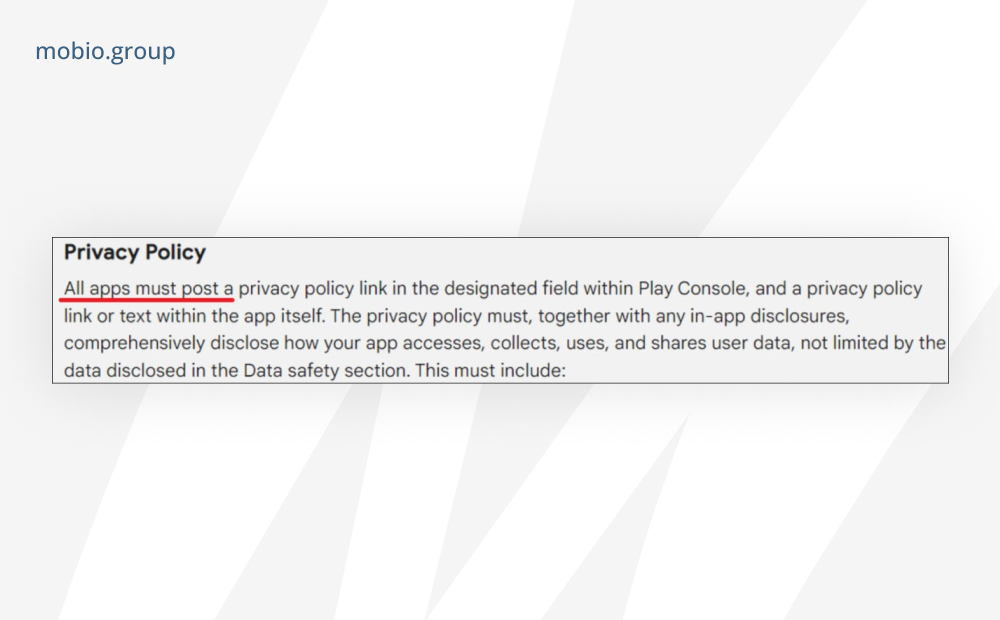
Without an appropriate Privacy Policy, the app will be rejected from both the App Store and Google Play Store. Apps that do not have access to user personal data or simply do not collect it still need to provide a Privacy Policy.
Key Components of a Mobile App Privacy Policy
Although Privacy Policies may vary depending on the type of app, there are some key components that should always be included:
◉ Types of Collected Data
This section lists the information provided by the user and the information obtained from other sources. The section should explain in detail what data is used, including account information, created content, payment information, user actions, third-party integrations, mobile device information, log data, IP addresses, cookies, etc. For example, the Fetch app lists the information it collects:
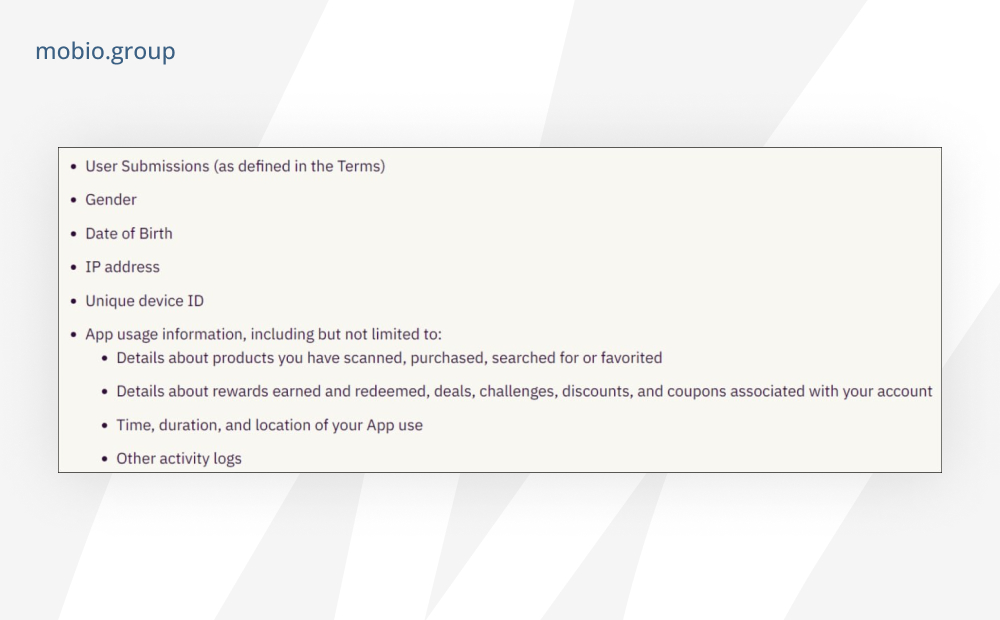
◉ Use of Data
The Privacy Policy should explain how the data collected by the app is used — whether it is used to improve functionality, for targeted advertising, for research purposes, to improve user interaction, or to personalize content.
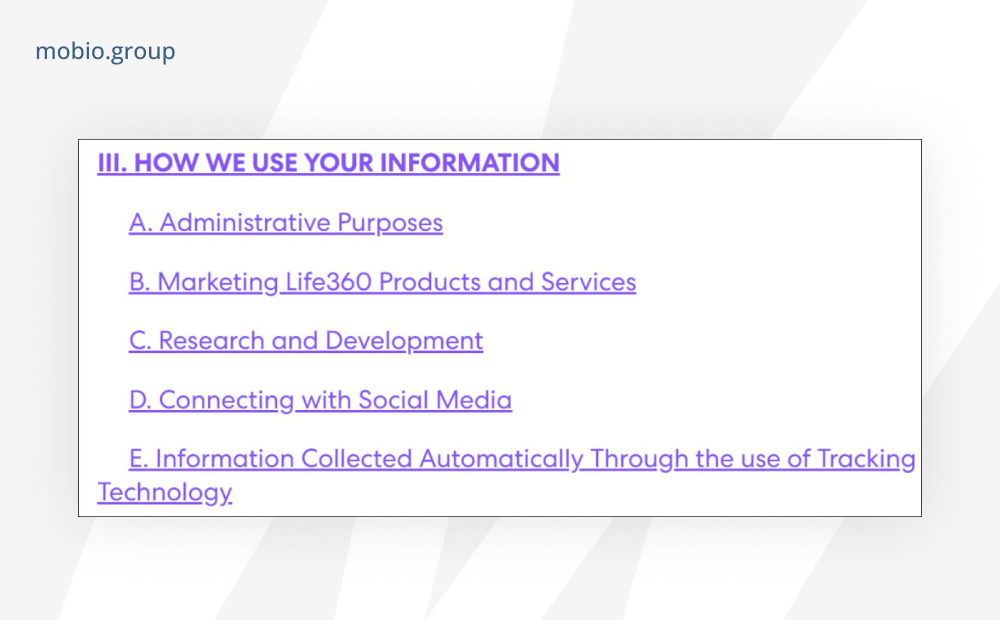
◉ Disclosure to Third Parties
The policy should disclose who the app shares user data with, such as third-party analytics or advertising providers. For example, Roots, an app for panic attacks, indicates how information is shared with Facebook:
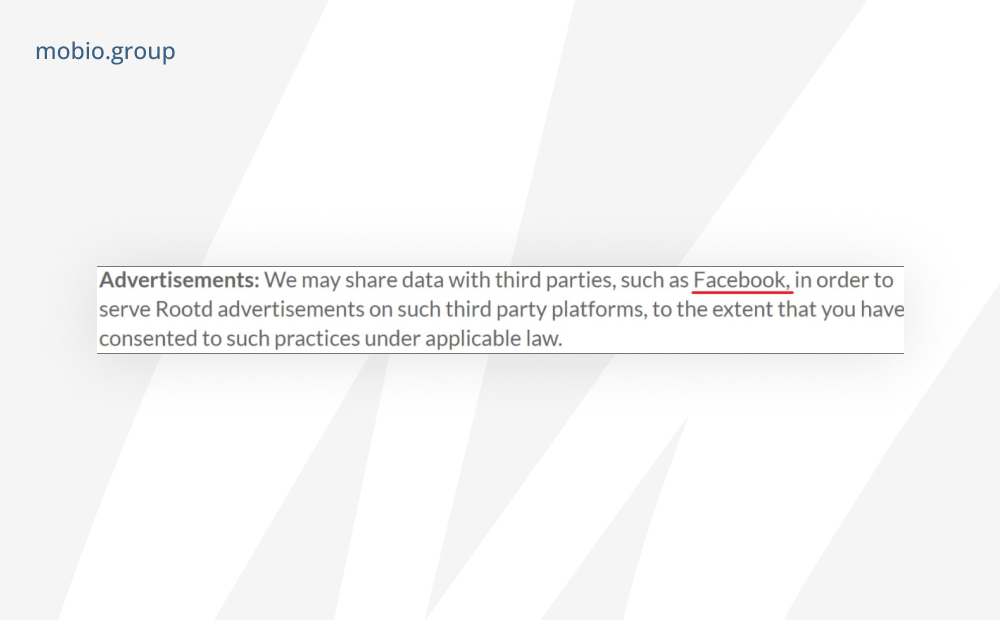
◉ Security Measures
The policy should describe in detail the measures taken to protect user data, such as encryption and access control. The measures taken by NeuroNation are shown below.
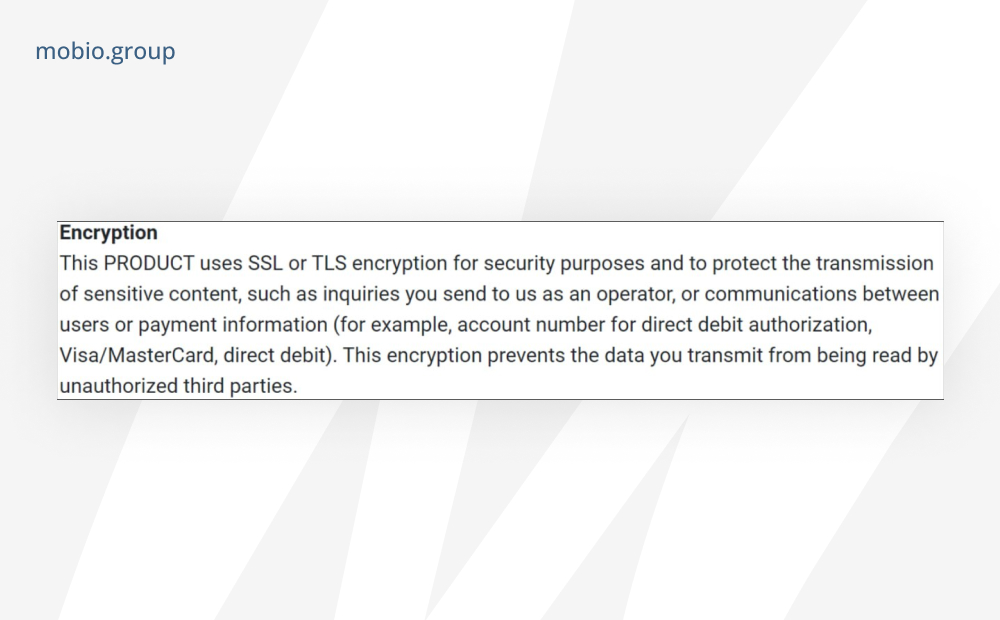
User rights should also be outlined: the policy should inform users of their rights, such as the right to access, correct, and delete their own data.
◉ Children’s Privacy
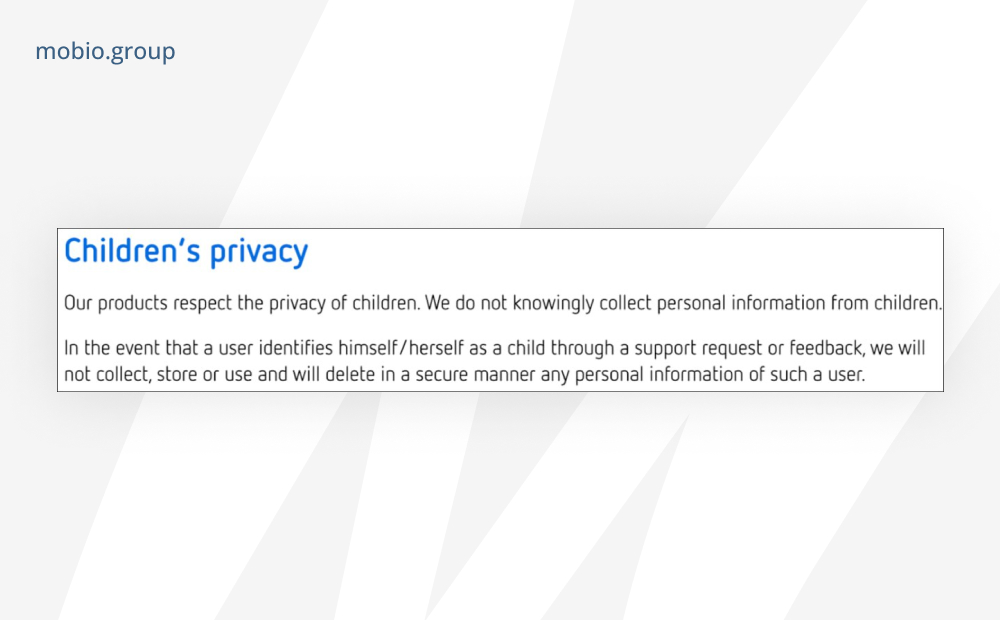
Even if the app is not intended for children, this topic is best addressed separately in the policy. Watermelon Prober, an app for checking watermelon ripeness, did this as follows:
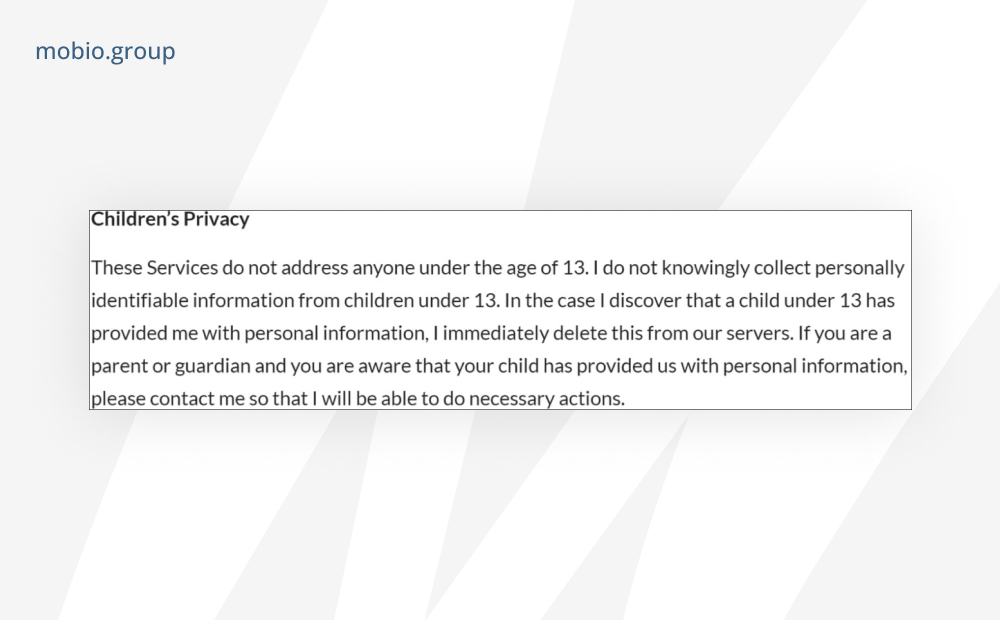
Contact information and a message about compliance with laws and rules are mandatory parts of the Privacy Policy. The policy should also be regularly updated to reflect any changes in how the app collects, uses, or shares user data. Be sure to inform your users of any changes and give them the opportunity to review and accept the updated policy.
How to Create a Privacy Policy?
There are different ways to create your own Privacy Policy:
- Do it yourself. To do this, you will need to study the relevant legislation, analyze the existing policies of similar apps, and consult with a lawyer to avoid mistakes.
- Use a Privacy Policy generator and create your document based on a provided template.
Where to Find a Mobile App Privacy Policy Template:
There are many Privacy Policy generators available, each with their own personalized functions and advantages. Companies can choose the one that best suits their needs. Free functions are enough for small businesses, while paid “premium” options are available for complex or large businesses. We have compiled a list of the main generators that will help you create a Privacy Policy, taking into account the relevant legislation:
- TermsFeed. This popular generator offers customizable Privacy Policy templates. It also helps create other legal documents, such as terms of service or disclaimers.
- FreePrivacyPolicy. This generator offers a simple and convenient interface that allows users to create a Privacy Policy in just a few minutes. It also provides a range of customization options to ensure the policy meets the specific needs of each business.
- PrivacyPolicies. This generator allows the use of customizable templates that can be adapted to the specific requirements of a business. PrivacyPolicies can also create a range of other legal documents, including “Mobile App Terms and Conditions” and a cookie policy.
- Shopify. The service offers a range of features, such as automatic updates, multilingual support, and GDPR compliance. Shopify’s customizable templates are easily adaptable to the needs of a specific mobile app.
- GetTerms.io. The simple and intuitive interface of GetTerms.io allows for the quick creation of a custom Privacy Policy. It has several customization options to ensure that the Privacy Policy matches the type of business activity.
Where to Place the Privacy Policy of a Mobile App?
When publishing an Android app on the Google Play Store, the Privacy Policy is uploaded through the Play Console. For iOS apps, a link (URL) is required in App Store Connect. After the app is published on the App Store, Google Play, or AppGallery, the Privacy Policy link will be reflected in the “Information” or “Contact Developer” section.
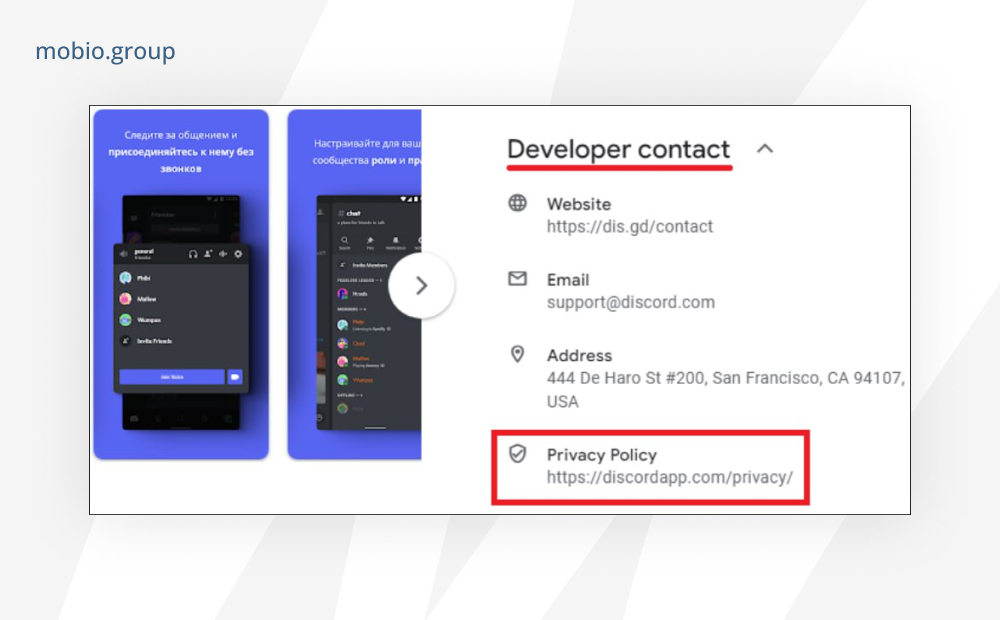
The link to the Privacy Policy should be easily accessible for users within the app. It is usually placed in the “Settings” or “About” menu. Users typically first encounter the Privacy Policy when downloading or setting up their account information. It is also necessary to provide easy and free access to the policy each time there are payments or any transactions made through the app.
Having a Privacy Policy for a mobile app is essential for successful promotion in app stores and building trust with users. By using Privacy Policy template generators, you can create a customizable policy and provide transparency and clarity to your users regarding their personal information, which can ultimately lead to a positive user experience and increased loyalty to your app.
FAQs
Are there any differences in the Privacy Policy requirements for App Store and Google Play?
Yes, some requirements differ. The iOS app’s Privacy Policy must include a section stating that third parties to whom your app transmits data comply with Apple’s policy, as well as a section on the storage and deletion of user data.
Do I need to create two different Privacy Policies for App Store and Google Play?
No. You can create one document that takes into account all requirements. Privacy Policy generators also provide templates for cross-platform apps.
How often should I update the Privacy Policy?
Anytime there are changes in the methods of data collection and use by your app, the policy should be updated, with changes announced to users. The date of the last policy update should be indicated in the document. When legislation changes, app stores notify app owners of the need to update their Privacy Policy and provide some time to bring the document in line with new requirements.
This article is not a substitute for legal advice. We are not lawyers, but excellent specialists in the advertising business. Our Mobio Group team tracks all changes in the digital market and uses all our experience to help your app fully realize its potential and grow your business.


